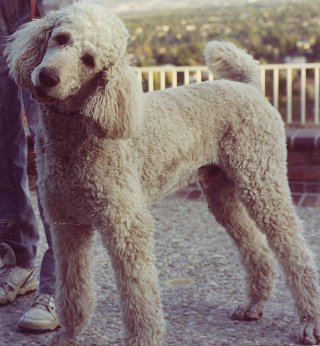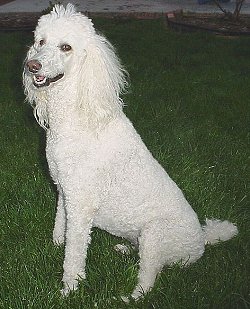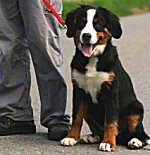Standard Poodles: What's Good About 'Em, What's Bad About 'Em
Standard Poodle temperament, personality, training, behavior, pros and cons, advice, and information, by Michele Welton, Dog Trainer, Behavioral Consultant, Author of 15 Dog Books

Many people have misconceptions about Poodles – that they look and act like "sissy" dogs.
That is one of the biggest myths in dogdom.
First, ignore the silly show-ring clips. Poodles can be clipped into shorthaired, normal-looking dogs who are a snap to brush. Poodles also have the advantage of being the lightest-shedding, most hypoallergenic of all coated breeds.
Second, Standard Poodles are elegant, energetic athletes who move with a light, springy gait. They excel in advanced obedience competition, where retrieving and jumping skills are required, and in agility (obstacle course) competitions, where they fly over and under and through the obstacles with a strength and grace that is breathtaking to watch.
Even better, a good Standard Poodle is one of the smartest and most trainable of all breeds. He is a "thinking" dog who pays rapt attention to his owner, learns quickly, and responds eagerly to positive training methods. Indeed, Standard Poodles NEED some sort of mental stimulation in order to be happy – advanced obedience classes (not just basic), agility classes, or challenging games such as hide 'n seek, or fetching a variety of named toys. This intelligent breed cannot simply sit in the backyard and be ignored.
Most Standard Poodles make great watchdogs and some even have mild (and sensible) protective instincts, but this is not an aggressive breed. Their attitude toward people varies from friendly to politely reserved. Early socialization is important to avoid excessive watchfulness or timidity.
With other dogs and cats, Standard Poodles are usually peaceful and accepting.
However, this breed is by no means perfect or low-maintenance. Besides the regular clipping (every 4-6 weeks), they need a good deal of daily exercise. Their energy level varies from moderate to high and they require brisk walks, jogging, swimming, and/or vigorous play sessions to keep them fit, satisfied, and calm indoors.
Standard Poodles also need a lot of daily companionship. They suffer from loneliness and separation anxiety if left alone too much.
Most Standard Poodles are "soft" and sensitive dogs, sometimes hypersensitive. If you touch them unexpectedly or startle them with a sudden loud sound, they tend to flinch. The most sensitive individuals are not good with small children.
Similarly, Standard Poodles can get emotionally upset if there's too much activity or conflict or roughhousing in your household – they prefer peace and harmony.
You do have to watch your lines: some Standard Poodle lines are high-strung, nervous, even neurotic.
If you want a dog who...
- Is medium to large, combining sturdiness and athleticism with elegance and grace
- Has a short curly coat that is virtually non-shedding (poodles of any size are the best dog breed for people with allergies)
- Comes in a variety of colors
- Is lively and playful
- Is one of the brightest and most attentive of all breeds, such a skilled reader of body language and expression, that he often appears telepathic
- Is easy to train and housebreak
- Is usually polite with strangers and sociable with other animals
A Standard Poodle may be right for you.
If you don't want to deal with...
- A careful search to avoid the high-strung lines
- Vigorous exercise requirements
- Exuberant jumping, romping, and bounding about, especially when young
- Skittishness in some lines, or when not socialized enough
- Emotional sensitivity to stress, tension, and loud voices
- Clipping the curly coat every six weeks
- Barking
- Serious potential health issues
A Standard Poodle may not be right for you.
 |
Dog Breed Traits – Which Traits Are Right For You? In this brand new series, I'll help you decide which dog breed traits would best suit you and your family, your home and yard, and your lifestyle, so you can choose the best dog breed for your family. |
Keep in mind that the inheritance of temperament is less predictable than the inheritance of physical traits such as size or shedding. Temperament and behavior are also shaped by raising and training.
FREE eBooks by Michele Welton
![]() "Respect Training for Puppies" and "Teach Your Dog 100 English Words" are free step by step guides to teaching your pup to be calm and well-behaved.
"Respect Training for Puppies" and "Teach Your Dog 100 English Words" are free step by step guides to teaching your pup to be calm and well-behaved.
![]() "11 Things You Must Do Right To Keep Your Dog Healthy and Happy" is a free guide to keeping your dog mentally, physically, and emotionally happy and healthy so you can enjoy a longer lifetime of companionship.
"11 Things You Must Do Right To Keep Your Dog Healthy and Happy" is a free guide to keeping your dog mentally, physically, and emotionally happy and healthy so you can enjoy a longer lifetime of companionship.

- You can avoid some negative traits by choosing an ADULT dog from an animal shelter or rescue group. With an adult dog, you can easily see what you're getting, and plenty of adult Standard Poodles have already proven themselves not to have negative characteristics.
- If you want a puppy, you can avoid some negative traits by choosing the right breeder and the right puppy.
More traits and characteristics of the Standard Poodle
If I was considering a Standard Poodle, I would be most concerned about...
- Providing enough exercise and mental stimulation. If you like poodles but you have limited space in your home and yard, get a Miniature Poodle, not a Standard. Standard Poodles do differ, from dog to dog, in how much exercise they want and need. But to keep them fit and healthy, you should be able to provide a good-sized yard where they can run, and regular play sessions at the park. Some Standard Poodles want even more opportunities to vent their energy and do interesting things; otherwise they will become rambunctious and bored, which they usually express by hyperactivity, barking, and destructive chewing.
It makes me sad to see these extremely intelligent and capable dogs relegated to homes where the owner just wanted a casual pet. It's a waste of a brilliant breed. I strongly encourage you to get your Standard Poodle involved in advanced obedience classes and agility (obstacle course) classes at your local dog club. Also see my free online training program, Teach Your Dog 100 English Words.
- Bounciness. Young Standard Poodles (up to about two years old) romp and jump with great vigor, and things can go flying, including small children and infirm people.
 Providing enough socialization. Standoffish by nature, Standard Poodles need early exposure to people and to unusual sights and sounds. Otherwise their natural caution can become skittishness or suspiciousness, which are difficult to live with.
Providing enough socialization. Standoffish by nature, Standard Poodles need early exposure to people and to unusual sights and sounds. Otherwise their natural caution can become skittishness or suspiciousness, which are difficult to live with.- Emotional sensitivity. Be honest... is there tension in your home? Are people loud or emotional? Poodles are extremely sensitive to stress and can end up literally sick to their stomachs, with digestive upsets and neurotic behaviors, if the people in their home are having family problems. Poodles are peaceful, sensitive dogs who need a peaceful, harmonious home.
- Grooming. To keep their curly coat short and free of mats, Standard Poodles require regular brushing, plus clipping every 4 to 6 weeks. Don't like the frou-frou look of most Poodles? Just clip him to look like a normal dog, with a short coat and no pompoms.
- Barking. Standard Poodles are alert dogs, which can make them quick to sound the alarm at every new sight and sound. You have to be equally quick to stop them so that it doesn't become an established habit.
- Serious health problems. Inbreeding is extremely high in Standard Poodles, which has led to a host of health problems becoming embedded in the gene pool. Standard Poodles are at risk for eye diseases, skin diseases, digestive diseases, immune system diseases, seizures, and more. Read more about Standard Poodle Health.
My best-selling books – now available FREE on my website
 Respect Training For Puppies: 30 seconds to a calm, polite, well-behaved puppy is for puppies 2 to 18 months old. Your puppy will learn the 21 skills that all family dogs need to know. Click here to read for free.
Respect Training For Puppies: 30 seconds to a calm, polite, well-behaved puppy is for puppies 2 to 18 months old. Your puppy will learn the 21 skills that all family dogs need to know. Click here to read for free. Teach Your Dog 100 English Words is a unique Vocabulary and Respect Training Program that will teach your adult dog to listen to you and do what you say. Click here to read for free.
Teach Your Dog 100 English Words is a unique Vocabulary and Respect Training Program that will teach your adult dog to listen to you and do what you say. Click here to read for free. 11 Things You Must Do Right To Keep Your Dog Healthy and Happy helps your dog live a longer, healthier life. Get my honest advice about all 11 Things before you bring home your new puppy, because some mistakes with early health care cannot be undone. Click here to read for free.
11 Things You Must Do Right To Keep Your Dog Healthy and Happy helps your dog live a longer, healthier life. Get my honest advice about all 11 Things before you bring home your new puppy, because some mistakes with early health care cannot be undone. Click here to read for free.Related posts you might enjoy






